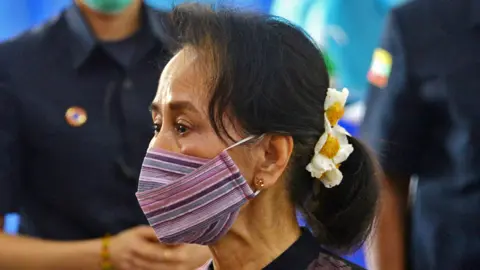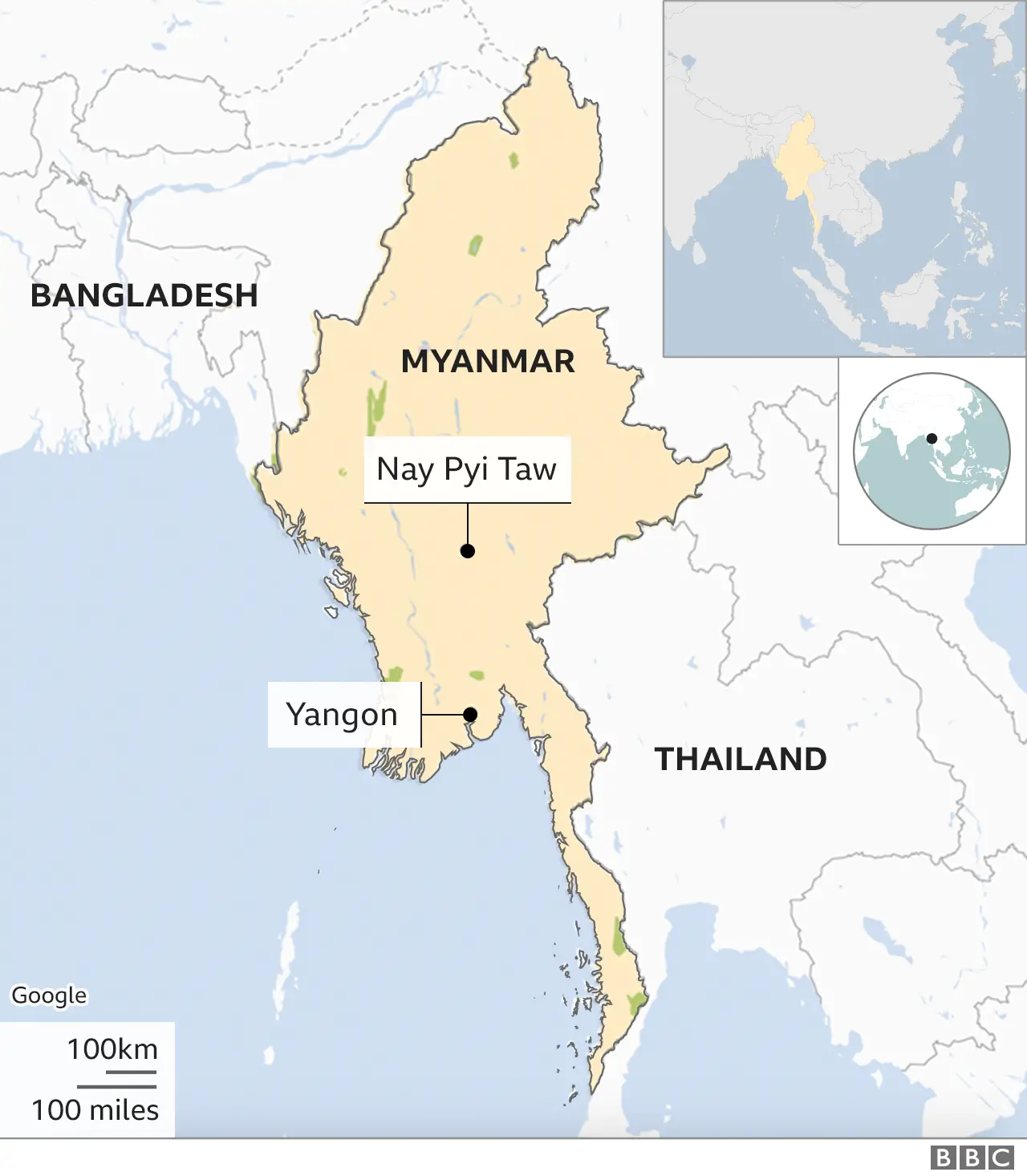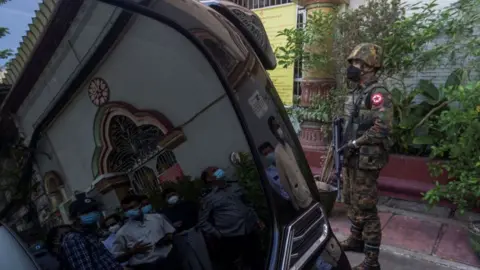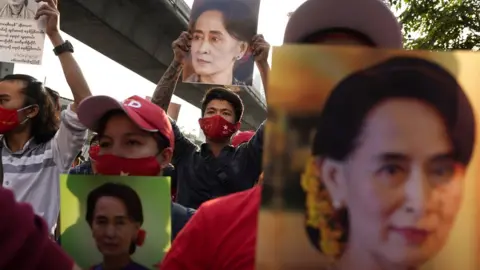Myanmar coup: Calls for Aung San Suu Kyi release
 Getty Images
Getty ImagesCalls are growing for the release of Myanmar's Aung San Suu Kyi a day after the army seized power in the south-east Asian nation.
Ms Suu Kyi, who led the country's elected government, has not been seen since she was detained by the military.
MPs who were confined in their accommodation in the capital, Nay Pyi Taw, have now been told they can leave.
But there are signs of defiance, including a medical staff strike and pot-banging in the main city Yangon.
The military took power in the early hours of Monday and declared a year-long state of emergency after accusing Ms Suu Kyi's party of fraud over its recent election win.
Her National League for Democracy (NLD) demanded her immediate release on Tuesday. It has also called upon the military to accept the results of the November election, which saw the NLD win more than 80% of the votes.
Myanmar, also known as Burma, was ruled by the armed forces until 2011, when a nominally civilian government was sworn in.


What is happening now in Myanmar?
The morning after the coup, the country remained calm. Streets were quiet, with troops patrolling all major cities and a night-time curfew in force.
The communications systems which had been disrupted on Monday had returned by Tuesday morning, with phone and internet connections running again.
But as night fell on Tuesday, car horns and the banging of cooking pots could be heard in the streets of Yangon in a sign of protest.
A campaign of civil disobedience appeared to be gathering steam with doctors working in government hospitals saying they would stop work from Wednesday to push for Ms Suu Kyi's release.
Some medics are resorting to wearing symbols in silent protest.
Allow X content?

At least one doctor has quit in protest, saying "such coups cannot be tolerated at all".
Dr Naing Htoo Aung, a 47-year-old anaesthesiologist at Mongywa Hospital in Sagaing Region, told BBC Burmese: "I resigned because I couldn't work under a military dictator who did not care about the country and the people. This is the best response I can give to them."
 Getty Images
Getty ImagesOne 25-year-old resident, who asked not to be named, told the BBC: "Waking up to learn your world has been completely turned upside down overnight was not a new feeling, but a feeling that I thought that we had moved on from, and one that I never thought we'd be forced to feel again."
More than 100 MPs, who were blockaded in their accommodation by troops in the capital Nay Pyi Taw, have now been told they are free to leave, BBC Burmese has learned.
Power has been handed over to commander-in-chief Min Aung Hlaing. Eleven ministers and deputies, including those in finance, health, the interior and foreign affairs, have been replaced.
In the first meeting of his cabinet on Tuesday, Min Aung Hlaing repeated that the takeover had been "inevitable" after the military made allegations of electoral fraud.

Frustration and anger
By Nyein Chan Aye, BBC Burmese, Yangon
This city of more than five million people is trying to get back to normal but has yet to digest the previous day's events.
The streets are quieter than usual this morning and security forces are deployed at major points. Panic buying has stopped and telecommunications services are back.
Private banks are resuming their services after temporarily closing down on Monday. Many people are withdrawing cash to brave the uncertain times ahead.
In Nay Pyi Taw, troops with tanks and trucks still surround the country's parliament.
It has been a bloodless coup so far, but the impact could be severe at a time of economic downturn amid the Covid pandemic.
The political turmoil, with possible international sanctions and foreign investment now uncertain, has left people frustrated and angry.

Where is Aung San Suu Kyi?
There have been no official statements on Ms Suu Kyi's exact whereabouts since she was detained in pre-dawn raids on Monday.
But unnamed sources from within the NLD have said both she and President Win Myint were being held under house arrest.
"We were informed not to worry. However we are worrying. It would be a relief if we could see photos of them at home," the MP told news agency AFP, on condition of anonymity.
Many of the other detained lawmakers are also still held in their government housing in the capital, with one member of the NLD describing it as "an open-air detention centre".
Ms Suu Kyi - who spent nearly 15 years in detention between 1989 and 2010 - has urged her supporters to "protest against the coup" in a letter written before she was detained. It warned the military's actions would put the country back under a dictatorship.
She was barred from becoming president because she has children born to a foreign national. But since the NLD's decisive election victory in 2015 she has been widely seen as de facto leader.

Myanmar at a glance
Myanmar is a country of 54 million people in south-east Asia which shares borders with India, China and Thailand, among others.
It was ruled by an oppressive military government from 1962 to 2011.
Nearly all expressions of dissent were banned and accusations of severe human rights abuses led to international condemnation and sanctions.
Aung San Suu Kyi spent years campaigning for democratic reforms. A gradual liberalisation began in 2010, though the military still retained considerable influence.
A government led by Ms Suu Kyi came to power after free elections in 2015. Her party won again by a landslide in the 2020 election. But the military have now stepped in to take control once more.

Could sanctions return?
US President Joe Biden has threatened to reinstate sanctions on Myanmar. He said the military should not "overrule the will of the people".
Along with the US, the United Nations, the UK and the EU have also condemned the military takeover.
The US had removed sanctions over the past decade as Myanmar progressed towards democracy.
Sanctions could theoretically be imposed on large companies linked to the military that deal in gems, clothing and have banking interests. They may also target individual generals. Other options include cutting aid, but there are concerns this could unfairly affect the wider population.
 Reuters
ReutersIt is unclear though how much effect the US warnings will have. The coup leaders will have expected sanctions and factored those into their plans.
Toe Zaw Latt, Myanmar bureau chief of the Democratic Voice of Burma (DVB), a non-profit news organisation based outside of Myanmar, told the BBC that the military will know sanctions are an unavoidable consequence of their actions, adding that "they don't care about Western sanctions" and are more concerned "about how China, Japan, South Korea respond".
"The country enjoys Chinese protection and South East Asian markets," Myanmar expert Elliott Prasse-Freeman of the National University of Singapore explains.
"Hence I expect them to react to sanctions with a shrug, the price paid for reasserting power and assuaging the humiliation of losing to their democratic enemies in two consecutive elections."
China, which has previously opposed international intervention in Myanmar, urged all sides in the country to "resolve differences". China's Xinhua news agency described the changes as a "cabinet reshuffle".
Other countries in the region, including Cambodia, Thailand and the Philippines, have said it is an "internal matter".
